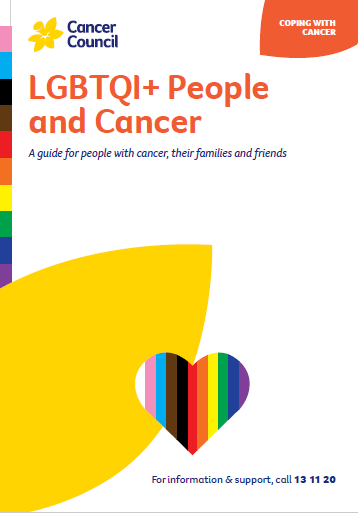- Home
- About Cancer
- LGBTQI+ People and Cancer
- Fertility after cancer
Fertility after cancer
Many LGBTQI+ people hope to start a family. The path to becoming a parent is different for everyone. Having biological children is one way of starting a family, and one that is possible for some LGBTQI+ people. But it can be made difficult due to cancer treatments affecting your fertility.
Learn more about:
- Overview
- How cancer treatments affect fertility
- Ways to preserve fertility
- Checking fertility after treatment
- Pregnancy after cancer treatment
- Emotional impact of infertility
Overview
Before starting treatment, it’s important to discuss how cancer treatments may affect your ability to conceive a child or maintain a pregnancy (fertility) and your options for fertility preservation. You can still consider your fertility later, but there may not be as many options available after treatment.
Your doctor may not discuss whether you want children in the future if they make assumptions based on your sexual orientation, gender or intersex variation. If fertility matters to you, let your health professional know.
How cancer treatments affect fertility
Cancer and its treatment may affect your fertility. This will depend on the type of cancer, whether you’ve had surgery, chemotherapy or radiation therapy, and your age.
Infertility caused by treatment can be temporary – difficulty conceiving may happen only during treatment or for months or years after treatment. Sometimes it is permanent. Treatments can also cause early menopause. You will be advised to avoid conceiving during cancer treatment and for a period of time afterwards.
For more on this, see Fertility and cancer.
→ READ MORE: Ways to preserve fertility
Podcast: Sex and Cancer
Listen to more of our podcast for people affected by cancer
We thank the chief investigators from the Out with Cancer research project: Prof Jane Ussher, Prof Janette Perz, Prof Martha Hickey, Prof Suzanne Chambers, Prof Gary Dowsett, Prof Ian Davis, Prof Katherine Boydell, Prof Kerry Robinson and Dr Chloe Parton. Partner investigators were Dr Fiona McDonald and A/Prof Antoinette Anazodo. Research Associates were Dr Rosalie Power, Dr Kimberley Allison and Dr Alexandra J. Hawkey.
We thank the reviewers of our LGBTQI+ People and Cancer booklet: Prof Jane Ussher, Chair, Women’s Heath Psychology and Chief Investigator, Out with Cancer study, Western Sydney University, NSW; ACON; Dr Kimberley Allison, Out with Cancer study, Western Sydney University, NSW; Dr Katherine Allsopp, Supportive and Palliative Care Specialist, Westmead Hospital, NSW; A/Prof Antoinette Anazodo OAM, Paediatric and Adolescent Oncologist, Sydney Children’s Hospital, NSW; Megan Bathgate, Consumer; Gregory Bock, Clinical Nurse Consultant–Oncology Coordinator, Urology Cancer Nurse Coordination Service, WA Cancer & Palliative Care Network, WA; Morgan Carpenter, Executive Director, Intersex Human Rights Australia (formerly OII Australia); Prof Lorraine Chantrill, Medical Co-Director Cancer Services, Illawarra Shoalhaven Local Health District, NSW; A/Prof Ada Cheung, Endocrinologist, Head, Trans Health Research Group, Department of Medicine (Austin Health), The University of Melbourne, VIC; Bonney Corbin, Australian Women’s Health Network; Cristyn Davies, Research Fellow, Specialty of Child and Adolescent Health, Faculty of Medicine and Health, The University of Sydney and Children’s Hospital Westmead Clinical School, NSW; Prof Ian Davis, Professor of Medicine, Monash University and Eastern Health, Medical Oncologist, Eastern Health, Chair, ANZUP Cancer Trials Group, VIC; Rebecca Dominguez, President, Bisexual Alliance Victoria; Liz Duck-Chong, Projects Coordinator, TransHub and Trans Health Equity, ACON, NSW; Lauren Giordano, 13 11 20 Consultant, Cancer Council NSW; Hall & Wilcox (law firm); Natalie Halse, BCNA Consumer Representative; Jem Hensley, Consumer; Prof Martha Hickey, Professor of Obstetrics and Gynaecology, The University of Melbourne, and Director of the Gynaecology Research Centre, The Women’s Hospital, VIC; Kim Hobbs, Clinical Specialist Social Worker – Gynaecological Cancer, Westmead Hospital, NSW; Dr Laura Kirsten, Principal Clinical Psychologist, Nepean Cancer Care Centre, NSW; Amber Loomis, Policy and Research Coordinator, LGBTIQ+ Health Australia; Julie McCrossin and Melissa Gibson, Consumers; Dr Fiona McDonald, Research Manager, Canteen, NSW; Dr Gary Morrison, Shine a Light (LGBTQIA+ Cancer Support Group); Penelope Murphy, Cancer Council NSW Liaison, Prince of Wales Hospital, NSW; Dr Rosalie Power, Out with Cancer study, Western Sydney University, NSW; Jan Priaulx, 13 11 20 Consultant, Cancer Council NSW; Paul Scott-Williams, Consumer; Simone Sheridan, Sexual Health Nurse Consultant, Sexual Health Services, Austin Health, VIC; Cheryl Waller and Rhonda Beach, Consumers.
View the Cancer Council NSW editorial policy.
View all publications or call 13 11 20 for free printed copies.
Need to talk?
Support services
Coping with cancer?
Speak to a health professional or to someone who has been there, or find a support group or forum
Need legal and financial assistance?
Pro bono services, financial and legal assistance, and no interest loans
Cancer information
Dealing with the diagnosis
Common reactions to a cancer diagnosis and how to find hope
Explore our resource hub
Explore and download our booklets, fact sheets, podcasts, webinars and videos for people affected by cancer
